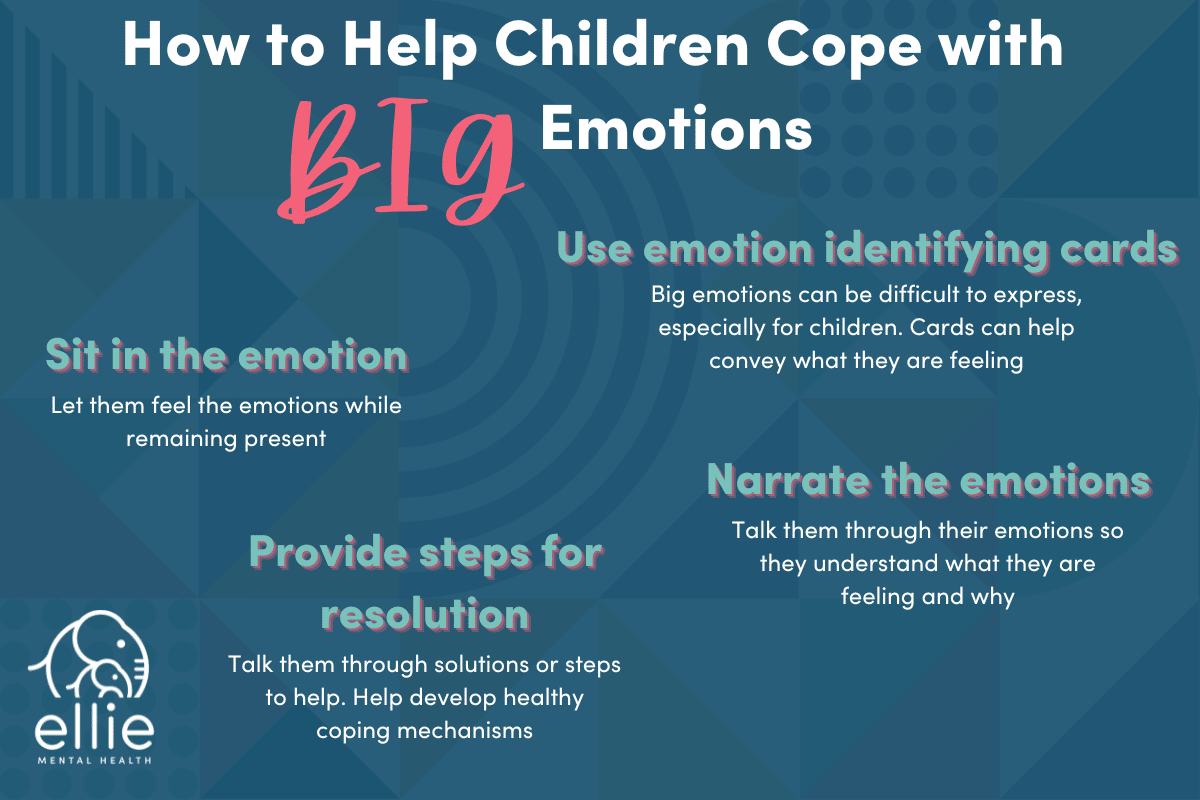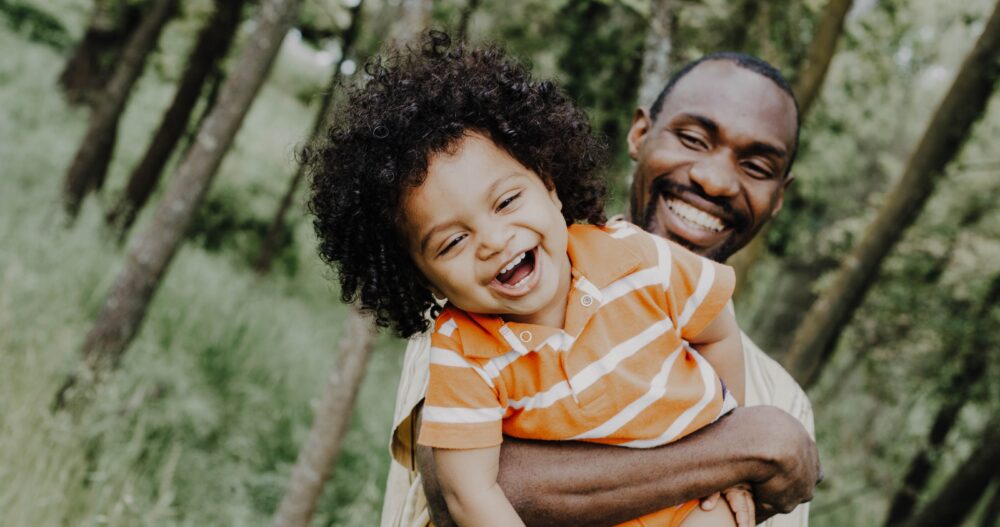Often when we think of coping, we think of learning to “move on” from a traumatic experience. When it comes to our children learning to cope, we may think, “what does that have to do with my child? My child has emotions, but they haven’t experienced trauma… why do they need to learn to cope?” This article will define what it means to cope, identify different styles of coping, and provide some tools to help children cope with their big emotions.
Coping: Defined
Coping is a tool we as humans use to handle difficult emotions. According to the Cambridge Dictionary, to cope means ‘to deal successfully with a difficult situation’. When we have healthy coping skills in place we can handle everyday emotions, tasks, and upsets with ease.
For children, coping is learned through what is modeled for them by the adults in their lives. This means your children are learning from you… you learned from your parents or guardians, and so on. The question now becomes, when your child experiences something difficult, how do you respond?
Identifying Coping Styles in Adults
Below are four ways you may respond to a difficult situation. As you read through the list, is there one that resonates with you?
1. Run away from or ignore the situation
2. Cry about it
3. Complain or yell
4. Look for ways to solve or provide tools for resolution
Choosing to run away from or ignore a situation indicates a deflection mindset to coping. It is likely this person would rather pretend the conflict doesn’t exist and not deal with it. People who deflect may believe if they ignore the conflict, it will just go away or someone else will resolve it.
Someone who immediately cries about a situation has an emotional breakdown mindset to coping. This person would rather breakdown and leave the conflict or issue for another person. The underlying belief is if they cry about the situation, someone else will fix it.
A person who turns to complaining and yelling likely uses a victim or blaming mentality to cope. They would rather spend time blaming other people for the conflict than find ways to resolve it. Believing if they complain about it enough, someone else will eventually make the changes.
The person who identifies most with the fourth option displays a resolution-based mindset to coping. They see the issue and look for ways to resolve it, as well as to use the situation to learn and grow from it.
Coping with difficult situations is not just tied to learning to handle them, but also in how we resolve them.
Coping Skills in Action
To understand this a bit more, lets imagine a group of children playing at a playground with their adults nearby. Remember, children are learning their coping skills from the adults in their lives!
In this scenario, two kids are playing, and run over to a slide. One child gets there faster than the other. The second child is bothered that they are now second to go down the slide and tries to push the other child out of the way. Nearby, the adults are watching this play out and their coping skills go into effect.
From our example above, the ignoring parent probably pretends to miss the whole thing, hoping another parent will step in. When their child brings it to them, they may just brush off their feelings about the story. They are modeling their belief that if you ignore something, it will eventually go away.
The parent who copes with an emotional breakdown may be hovering nearby and when their child gets pushed, rush over and over-react to them being pushed. They are modeling that you can expect someone else to step in and fix your problem.
A parent who subscribes to a victim or blaming-mentality will start ‘pointing the finger’ at the child who got their first, blaming them instead of helping the other child to cope with being second. They are modeling to the children that someone is always to blame, rather than teaching them to take accountability.
Fourth, we have the overseer, who copes from a resolution-based mindset. When involving themselves, they will ask questions of both the children, and help them come to an understanding. They are modeling that a calm, rational approach will help find a resolution to the difficult situation.
Coping for children can be difficult, primarily because it involves the emotional response of their adults. When a child has BIG emotions, we can help them process through them using the following tools.
Four Tools To Help Children Cope With Big Emotions
Here are four tools I often find myself using when experiencing big emotions, as well as teaching to clients (of ALL ages):
1. SIT IN THE EMOTION.
Provide them with the opportunity to sit in their emotions. This is also known as ‘the calm down’. A great example of this is when a child is sad… let them be sad! While it can be hard, do not attempt to fix the sadness for them but be present so they feel safe and comfortable to talk about what has caused them to be sad. The ability to identify emotions helps us cope with them.
2. USE EMOTION IDENTIFYING CARDS.
Help the child with their big emotions, by using emotion cards (think: flash cards for feelings). By using the emotion cards, you are giving the child language or images to help them express the emotions they feel. You can create your own emotion cards or a set from the internet. This will help the child learn what emotion they are feeling. When they recognize the emotion, they can then work on coping with it and making the big emotion small.
3. NARRATE THE EMOTIONS.
Talk them through the emotion; observe and state what you are seeing and validate it for them. For a frustrated child, an example could be, “I can see you are really having a hard time and it is causing you to feel frustrated. Everyone gets frustrated sometimes.” Leave space for them to talk about what happened that may have caused their frustration, while continuing to validate their feelings. You can also encourage them to take a moment to breathe and reset. This will help them develop skills to recognize when emotions feel too big.
4. PROVIDE STEPS FOR RESOLUTION.
Walk them through some resolutions for dealing with the emotion. Children often get very upset or frustrated with tasks they are still learning. A great example of this, especially for young children, is difficulty putting on their shoes. Talking through the steps one at a time can help the child work through the emotions that come up around the difficult task. Provide them with different tips and tools to help navigate through the process. You can say things like “it might help if we loosen your strings”, or “it’s frustrating when we put the wrong shoe on the wrong foot!” or even, “let’s take a break, breathe, and try again”. The act of slowing down to process through each step will strengthen their coping skills.

Learning to Better Manage our Emotions
Our emotions are how we interact with the outside world. When we learn how to cope, we learn how to emotionally connect with the world around us. For children, learning the importance of emotions and healthy ways to cope is vital. Helping them develop these skills can give them words to express how they are feeling when they don’t know how. It is integral to how they will handle conflict, rejection, and emotional challenges throughout their lives.
As we learn to cope, we learn to better manage our emotions. We as parents and guardians, teachers, childcare providers, friends, and even other family members can help facilitate these emotional skills and help children to know that, while big feelings are inevitable, they are something we can control and manage.
Things to Remember…
As a parent, guardian, teacher, or adult in a child’s life… you got this! Your support will be everything to them. Additionally, we can always learn more effective or healthy coping styles to model for the children in our lives. There is no shame in seeing a therapist for yourself or your child if this is something you are struggling with.
Cambridge Dictionary (2022). Cope Definition. Retrieved on June 6,2022 from https://dictionary.cambridge.org/us/dictionary/english/cope
Need someone to talk to? Find a therapist near you today!


